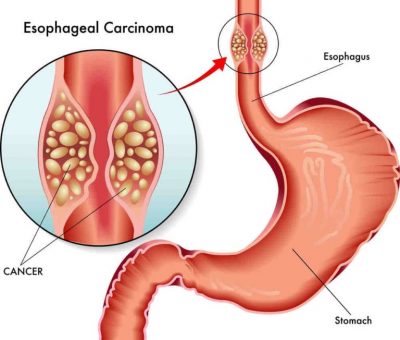-
 Call Now:
8010 552 552
7595 838 844
Call Now:
8010 552 552
7595 838 844
-
 Email Me:
clinicahealthkolkata@gmail.com
Email Me:
clinicahealthkolkata@gmail.com
The oesophagus or gullet is a muscle tube where food passes from the throat to the stomach. Esophageal cancer is a tumour that builds up in the oesophagus. The two main types are squamous cell carcinoma and adenocarcinoma. Both these types develop at about the same rate. Squamous cell carcinomas are more common in Asia, and adenocarcinomas are more prevalent and increasing rapidly in Western lands. Most of the esophageal cancers in Kolkata occur in people older than 65 years. Squamous cell carcinomas are strongly associated with alcohol and smoking and adenocarcinomas are strongly associated with gastroesophageal reflux which is closely related to obesity.
The main risk factors for oesophageal squamous cell carcinoma are: Tobacco use, Alcohol use, Low fruit and vegetable diets, Drinking maté, Betel quid chewing, certain medical conditions e.g. Achalasia, Tylosis and Plummer-Vinson syndrome.
Barrett’s stomach, reflux disease Gastroesophageal disease, Obesity.
Tobacco use and alcohol consumption may increase the risk of adenocarcinoma, although the effect is lesser than squamous cell carcinoma, says the best esophageal cancer doctor in Kolkata.

Adjuvant therapy is a method of treatment given in addition to the main esophagus cancer treatment in Kolkata, which in this case, the tumour is surgically removed. Chemotherapy used before surgery and, if possible, after surgery is a standard form of treatment. The combination of both radiotherapy and pre-surgery chemotherapy is another option.
Treatment planning involves the disciplinary team of medical professionals.
Treatment often includes interventions:
Take action with your local cancer, such as surgery or radiotherapy
It acts on cancer cells throughout the body with systematic treatment such as chemotherapy
Surgery is the treatment of choice for the best patients. When nearby lymph nodes are affected, surgery is still the best treatment. However, the affected lymph nodes interfere with the healing process of patients and therefore combined treatment that includes chemotherapy or chemotherapy with radiotherapy should be discussed in a multidisciplinary team if suspected involvement of lymph nodes in the first stage.
Part of the tumour containing the tumour will be removed during surgery. In addition to removing the tumour, the surgeon will remove all the nearby lymph nodes and oesophagus. They will be tested by a pathologist to see if they have any cancer cells, which is important to define.

He made my hernia surgery look trivial with all his expertise. Very good centre too with all modern amenities. Complete hasselfree experience.

God can’t go everywhere so he made doctors like Purnendu Bowmik
I have never seen such a good doctor with such a good mind ..

All my fissure related sufferring gone in a day! Laser procedure is really a boon for patients like us. Very good doctor. Great experience.
Mon to Sat: 8 am – 5 pm, Sunday: CLOSED